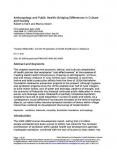
Print publication date: 2009
Print ISBN-13: 9780195374643
Published to Oxford Scholarship Online: Sep-09
DOI: 10.1093/acprof:oso/9780195374643.001.0001
This chapter examines the economic, ethical, and cultural complexities
of health policies that emphasize “cost-effectiveness” at the expense of creating stable health infrastructure. Drawing on ethnographic, archival, and oral history research in rural Central Java, Indonesia, it examines latrine and toilet construction efforts from the time of 1930s Rockefeller Foundation hookworm prevention projects to the present. Although hygiene and sanitation projects since the 1970s enabled over half of rural villagers to build indoor toilets, lack of water and drainage, patterns of drought, and the economy of fishponds has fostered continued public defecation in rivers, ponds, and drainage canals. Makeshift or partially completed sanitation programs have led to wide disparities in access to water and toilets. As a consequence, social difference has become encoded at the level of sanitary objects, as indoor toilets become temporal markers of status within village hierarchies centered on development discourses of modernization.
| Attachment | Size |
|---|---|
| 594.53 KB |
-

- Log in to post comments
- 279 reads


